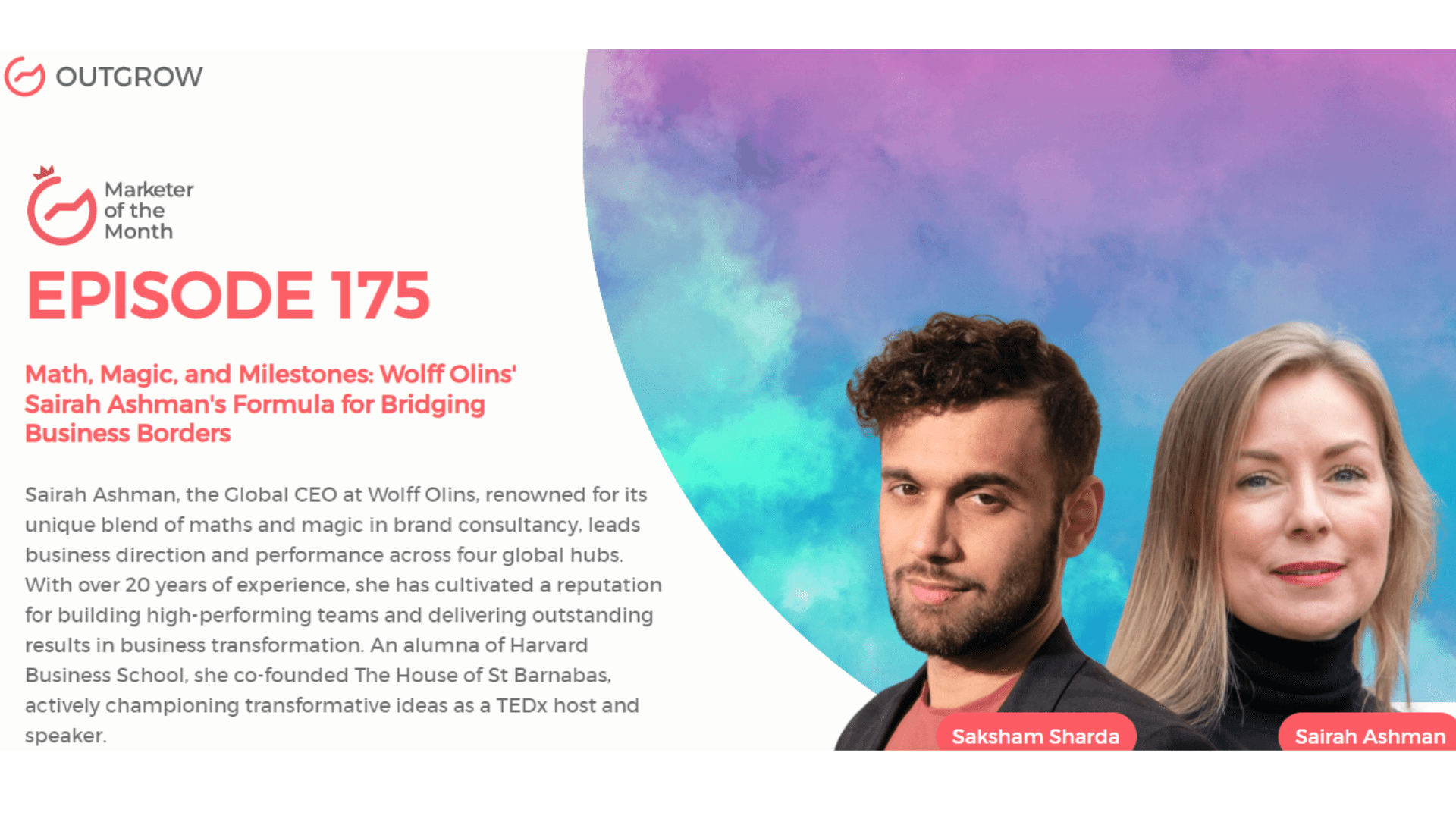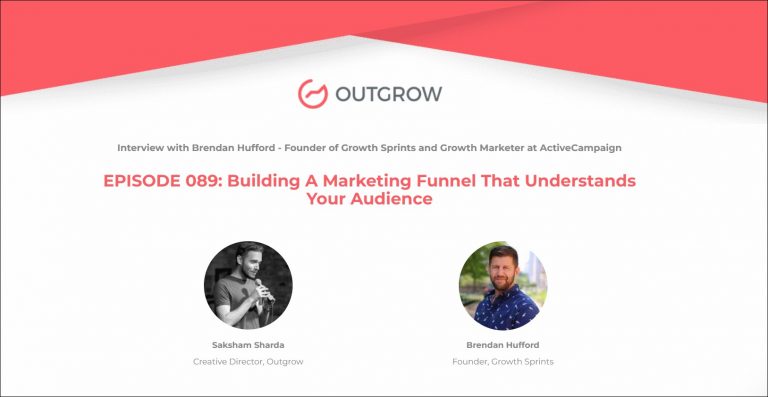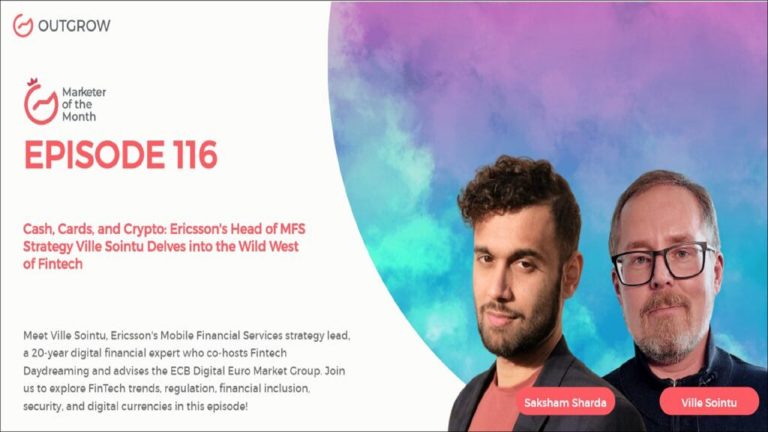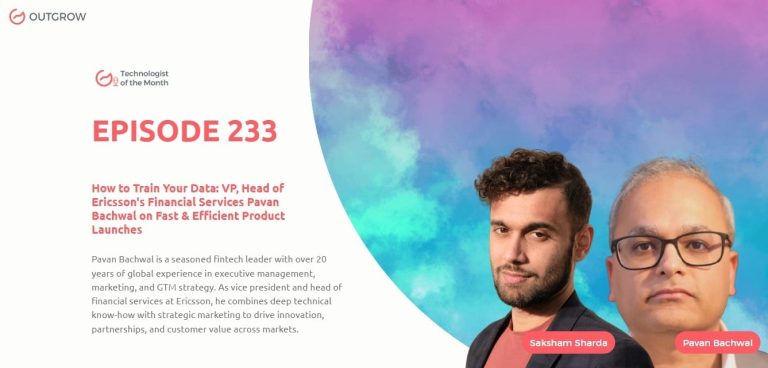EPISODE 175: Marketer of the Month Podcast with Sairah Ashman
Table of Contents
Hey there! Welcome to the Marketer Of The Month blog!
We recently interviewed Sairah Ashman for our monthly podcast – ‘Marketer of the Month’! We had some amazing insightful conversations with Sairah and here’s what we discussed about-
1. Addressing hurdles in building teams across varied cultures and markets.
2. Exploring methods to bridge cultural gaps in teams, emphasizing clear goal communication and the “math and magic” concept.
3. Examining the balance between analytical thinking and creativity when approaching complex problems.
4. Reflecting on key insights gained from Harvard Business School, focusing on increased confidence and an integrated approach.
5. Highlighting curiosity and diverse interests as catalysts for generating ideas in the dynamic business landscape.
6. Ensuring effective communication and goal alignment across different clubs through consistent rituals and leadership understanding of the organization’s values.
About our host:
Dr. Saksham Sharda is the Chief Information Officer at Outgrow.co. He specializes in data collection, analysis, filtering, and transfer by means of widgets and applets. Interactive, cultural, and trending widgets designed by him have been featured on TrendHunter, Alibaba, ProductHunt, New York Marketing Association, FactoryBerlin, Digimarcon Silicon Valley, and at The European Affiliate Summit.
About our guest:
Sairah Ashman, the Global CEO at Wolff Olins, renowned for its unique blend of maths and magic in brand consultancy, leads business direction and performance across four global hubs. With over 20 years of experience, she has cultivated a reputation for building high-performing teams and delivering outstanding results in business transformation. An alumna of Harvard Business School, she co-founded The House of St Barnabas, actively championing transformative ideas as a TEDx host and speaker.
Math, Magic, and Milestones: Wolff Olins’ Sairah Ashman’s Formula for Bridging Business Borders
The Intro!
Saksham Sharda: Hi, everyone. Welcome to another episode of Outgrow’s Marketer of the Month. I’m your host, Dr. Saksham Sharda, and I’m the creative director at Outgrow. co. And for this month we are going to interview Sairah Ashman, who is the CEO of Wolff Olins.
Sairah Ashman: Great to be here. Thank you.
Don’t have time to read? No problem, just watch the Podcast!
Or you can just listen to it on Spotify!
The Rapid Fire Round!
Saksham Sharda: When do you want to retire?
Sairah Ashman: Who’s ever going to retire?
Saksham Sharda: How long does it take you to get ready in the mornings?
Sairah Ashman: 20 minutes.
Saksham Sharda: Most embarrassing moment of your life?
Saksham Sharda: What time of day are you the most inspired?
Sairah Ashman: 7 am.
Saksham Sharda: How many hours of sleep can you survive on?
Sairah Ashman: Oh, you know, just the average 10.
Saksham Sharda: The City in which the best kiss of your life happened.
Sairah Ashman: Thailand.
Saksham Sharda: The biggest mistake of your life?
Sairah Ashman: No mistakes. I am just learning.
Saksham Sharda: How do you relax?
Sairah Ashman: With friends and family.
Saksham Sharda: How many cups of coffee can you survive?
Sairah Ashman: One.
Saksham Sharda: A habit of yours that you dislike.
Saksham Sharda: A valuable skill you’ve learned in life?
Sairah Ashman: Versatility.
Saksham Sharda: What’s your favorite Netflix show?
Sairah Ashman: No favorite.
Saksham Sharda: The last film you saw that had a good impression on you.
Sairah Ashman: The menu.
Saksham Sharda: And also the last song you listened to?
Sairah Ashman: Teenage kicks.
The Big Questions!
Saksham Sharda: So that’s the end of the rapid fire. We’re gonna go on to the longer questions. First question – Building and nurturing successful teams in diverse market situations and cultures must come with its own set of challenges. Could you share a specific example of how you navigated those challenges and fostered collaboration among team members from different backgrounds?
Sairah Ashman: So I’ll talk about Wolfeboro, Linz, and the many studios that we have, which are in different parts of the world. And for me, I think your starting point has to be getting to know the people involved in the first place. I don’t know how you can build a great team, a high-performing team, and one that likes working together. You don’t understand what drives everybody and what’s important for them. So I like to spend a lot of time with everyone new, I like to meet them. However big we are, and however big we get. I like to know what motivates people a little bit about their personal lives where they come from what they value. And then I find it a lot easier to be able to construct a way that we could work together and then we can kind of learn together in terms of how to get the best out of everyone.
Saksham Sharda: What strategies or approaches have you found effective in bridging cultural and market differences within a team to foster a cohesive work environment?
Sairah Ashman: Being clear about the goals. And not just in a verbal sense, you know, I think as soon as you think everyone’s got it, you can assume they haven’t. And that’s on you. You have to make sure that you’re communicating verbally in writing reinforcing you’ve got the right rituals to keep the goals in mind and that you’re constantly checking in with people to know that they’ve got what they need to deliver those goals and then you can keep reinforcing to I love the concept of math and magic, consultancies, parties.
Saksham Sharda: Can you provide an example of a specific challenge you faced while building diverse teams in different market situations, and how you overcame it?
Sairah Ashman: So math and magic was a quote that a McKinsey partner attributed, you know, to the US based on how we were working because we weren’t we share, you know, a fair few clients, which was very generous of them. We took that. And I think it’s because we were one of the few consultancies that were born that way. So I couldn’t pick out one client because it’s just part of our DNA. You know, we were founded by a strategist and a creative and a culture and An Account Manager. So that combination meant that we didn’t have to try to do that. It’s just very natural for us. And, and that means that we can find lots of different ways to solve problems. Without having to say, right, this is the math bit. And this is the magic bit: the magic is actually that we do it all at the same time.
Saksham Sharda: So how do you strike the right balance between analytical thinking, and creativity when approaching complex problems?
Sairah Ashman: By collaborating and by asking good questions, and by challenging everything that we’ve come up with, and throwing stuff away and trying again, so yeah, it’s an iterative process.
Saksham Sharda: How do you ensure effective communication and alignment of goals across the different clubs?
Sairah Ashman: Lots of different things help us do this. Rituals. So I like to think that whichever of our studios you’re in the culture of the nation will feel different, the rituals are all phones will not. So you feel like you’re in a good, comfortable, safe, positive place there. And the people in the leadership that we have at every level, I’m not just talking hierarchy here, like the people who join with Olins, know what we stand for and what we’re trying to do, and they know how to transmit that. So we put a lot of things in place to help everyone get comfortable with that, and then the rituals just, you know, become self-reinforcing.
Saksham Sharda: So it’s impressive how you have achieved outstanding results for clients through business transformation, could you share a specific story where you encountered unexpected challenges during a client project, and how you overcame those challenges to deliver exceptional results?
Sairah Ashman: So it’s really hard to like, pluck out one client example. Because I think every assignment has its challenges, but I’ll identify a few trends. One is a lack of alignment in an organization and differences of opinion at different levels as to what’s needed. So we do a lot of work, we know that. So we do a lot of work to solve that right off the bat. And then not having a clear sense of the same outcomes together, you know, talk about language, you know, we share a common language, but we don’t understand the meaning behind that language sometimes. So you have to spend a lot of time being clear about but when you say that, what do you mean, we know what we mean? And that’s helpful in the work that we do. And then sometimes, we don’t get it right. And we have to be very transparent and honest about that and have conversations with clients saying, you know, I want you to push us harder, or you’re pushing us too hard. And we have to be very undefended about that. Have that conversation and make it right, make it different.
Saksham Sharda: So as a member of the Harvard Business School, what were some key insights or lessons that you gained during your time?
Sairah Ashman: Lots, it was formative for me. But I think the biggest thing it gave me was confidence. And I think that’s what it gives to a lot of people who attend business school, it crystallizes a lot of what you already know. And it tests you to apply it. And it gives you some good structures and frameworks to use to help you kind of contain How you are doing now. It’s really valuable.
Saksham Sharda: How did it influence your leadership styles and strategy?
Sairah Ashman: It made me think in a very integrated way across lots of dimensions, whether that’s finance, marketing, strategy, so as all of those business schools do, and Harvard has a fantastic case study method, so you’re working through it forces you to think in real-time, how would I solve this? What do I think they’re doing? Right? What do I think could be different? And I think that fully integrated approach is, it’s just so real-world application straight off the bat. It’s great.
Saksham Sharda: So the House of St Barnabas sounds like a fantastic initiative. Could you tell us a bit more about the organization’s work and the specific ways in which you support their mission to break the cycle of homelessness?
Sairah Ashman: So that the House of St. Barnabas is amazing. It’s an incredible building in Soho London, that was given to a charity many years ago for homeless people, and it had several beds in it that you could go to, but it was very small, it didn’t have many beds. So it’s decided to change its model. And it decided to rate refurb and reopen as a membership club. So a private member’s club, but the idea is that as members you would pay money to go and use that club, and those who are affected by homelessness would be trained in an employment Academy. me that the House of St. Barnabas would fund with the money that they made through the member’s club. And those people would get work experience in the club. So when you’re in the club, you’re relating directly with people who have been affected by homelessness in some way. And they sponsor them and put them through a program where they can put a wraparound care program around them to help them back into work. All the things that you would, you would hope so it’s amazing. And I discovered it because I was walking paths. And I saw this whole building and I knocked on the door and I met two fabulous women, Sandra and Nadira. They told me what they were doing, I said, I want to apply, how can I apply? Let me in. And they were kind enough after an interview to say you’re just the right person to join us. And so I recommend them. I talked about them and became a member. And I joined one of their committees to also help them recruit new members. So yeah, that’s the house of bananas, I recommend it.
Saksham Sharda: In such a dynamic industry, staying ahead of emerging trends and ideas is crucial. How do you personally stay informed and inspired in this ever-changing business landscape?
Sairah Ashman: I’m really lucky to work with a bunch of really curious, talented people. So they turn me on to a lot of stuff, which is great, and I appreciate it. And then, you know, I’m a magpie. So I like kind of dipping into lots of different sources. And I don’t like to stay in one area too long. So my musical tastes are eclectic. My TV tastes are eclectic. All of these things, you know, contribute to triggering ideas. I’ve had a strong interest in technology for a long time. You know, I reach out to talk to people, so I read all the stuff everybody else would read, plus some.
Saksham Sharda: Great. So the last question for you is a personal one, what would you be doing in your life as an office?
Sairah Ashman: I can’t imagine doing anything else which is crazy to say out loud.
Let’s Conclude!
Saksham Sharda: Thanks, everyone for joining us for this month’s episode of Outgrow’s Marketer of the Month. That was Sairah Ashman, who is the CEO of Wolff Olins.
Sairah Ashman: Great to be here. Thank you.
Saksham Sharda: Check out the website for more details and we’ll see you once again next month with another marketer of the month.

Muskan is a Marketing Analyst at Outgrow. She is working on multiple areas of marketing. On her days off though, she loves exploring new cafes, drinking coffee, and catching up with friends.









